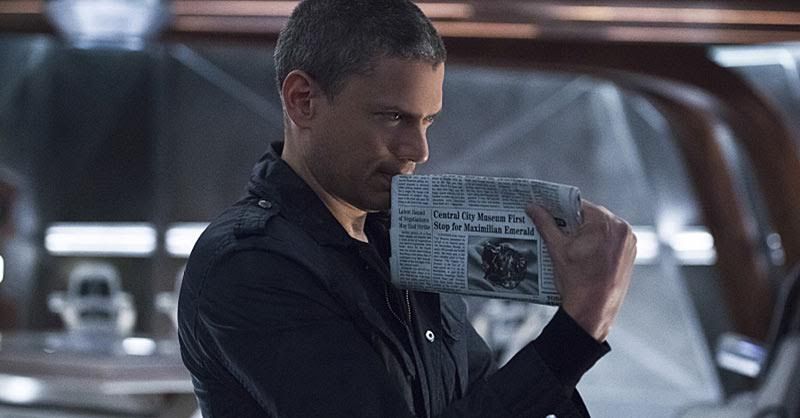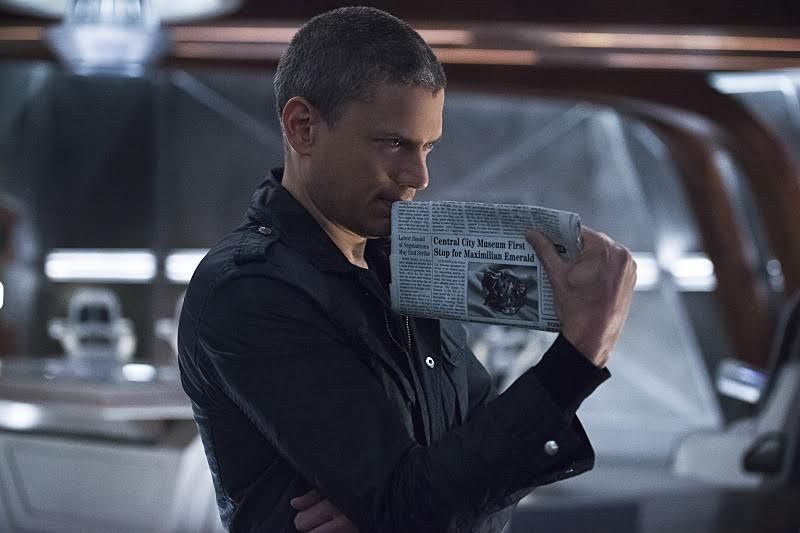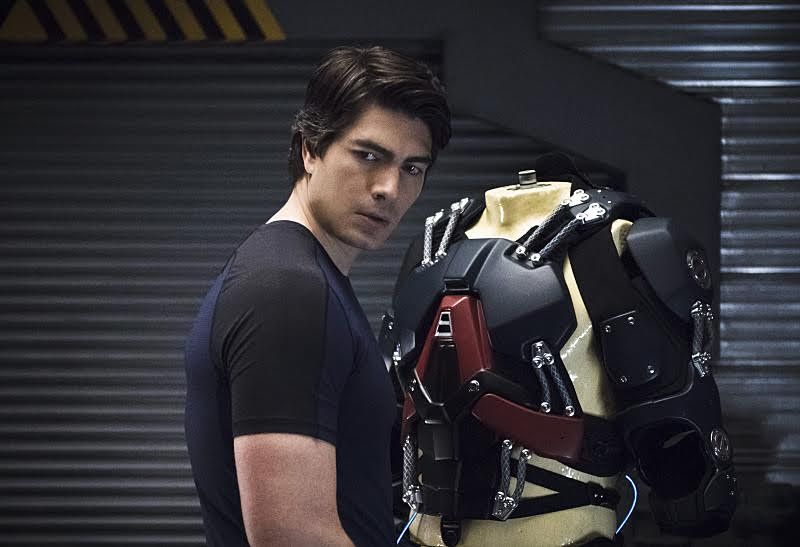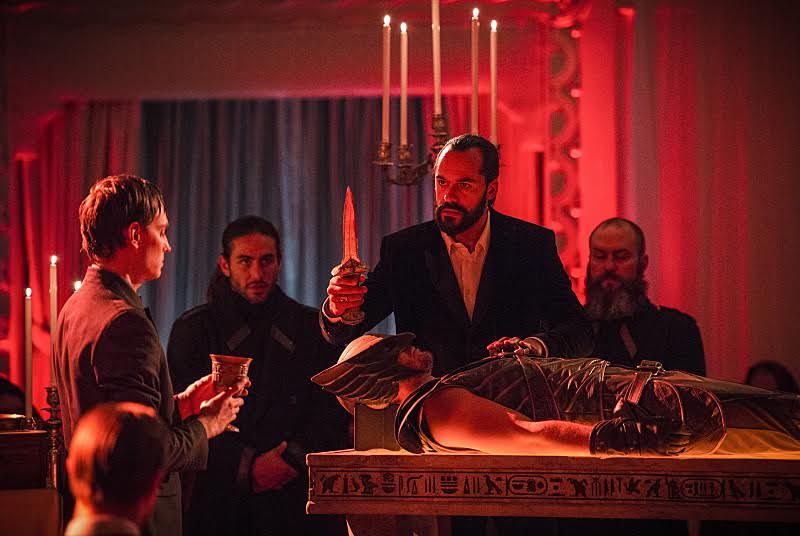For much of "Blood Ties," Rip Hunter's ship, The Waverider, is unable to time-jump out of 1975 due to the stab wound Hawkgirl got from Vandal Savage last week. As Professor Stein and The Atom prepare to enter surgery, Heat Wave scoffs.
"What're the rest of us supposed to do?" he asks. "Sit here?"
In fact, that's exactly what Hunter wants them to do, and, if I'm being honest, that's exactly what I want them to do as an audience member. The second half of the pilot was definitely a step in the right direction in terms of character development, but I still wouldn't mind it if the show slowed down a bit so those of us who haven't watched "Flash" and "Arrow" three times over can get to know these people. And while "Blood Ties" is still packed with plot across three different missions, each of those missions feels a little more self-contained, a little more intimate thanks to the personal details involved. Part of what's so appealing about the Legends is that each of them has fairly heavy baggage, making tonight's adventures not just adventures, but explorations of the characters' pasts.
In one corner, Captain Cold and Heat Wave are insistent on Jax helping them steal a valuable emerald from Central City. As much of an adrenaline fix it is for the two criminals, it becomes clear that the former has an ulterior motive. After the heist, he travels to a suburban home and places the jewel on the kitchen counter. Before he leaves, he encounters a little boy who turns out to be him, along with the boy's father, who holds him at gunpoint. Instead of fighting back, Captain Cold gives the man the jewel and makes his escape. As we discover later, this was all a preemptive strike to keep his father from stealing the emerald himself and getting thrown in prison. This, Captain Cold explains, was the turning point in his family's life -- once his dad got back, he began abusing his family.
Out of the three arcs tonight, Captain Cold's unfolds most naturally due to the mystery surrounding his actions. Slowly peeling away a criminal's icy exterior is an oft-used trick in genre storytelling, but it's common for a reason. When you have an actor like Wentworth Miller, who's able to shift his theatrical snark into vulnerability without the audience even realizing it, the payoff is huge, particularly at the end when it's revealed that his efforts were for nothing -- his father still ends up getting arrested. Chances are that will only make Captain Cold harder. It's not like he's the robber with a heart of gold; he's a robber who happens to have wants, emotions, and a brooding love for his family, just like so many of the rest of us.
Professor Stein and The Atom's storyline also calls upon shadows of the past, even though it feels a bit more forced. When The Atom shrinks himself and takes a "Fantastic Voyage"-type jaunt through Hawkgirl's body to blast away the lingering dagger shards, his lack of confidence (stemming from not being able to save his wife from dying) causes him to keep failing. This leads to a lot of back and forth between him and Stein, who claims not to remember him as one of his best and brightest students in class. He then admits that he does remember him and has just lied out of jealousy, not wanting to give The Atom proper intellectual credit. By the end, however, once Hawkgirl's dagger has been restored, Stein says he lied yet again and that, although he's sure Ray Palmer was brilliant in class, he had a lot of brilliant students.
Their exchanges are meant to explore Stein's buried arrogance as well as Palmer's grief and self-doubt, but end up feeling monotonous because of all the back and forth about their history together. While we get to see further developments of each man's flaws, the dialogue becomes tiresome from a raw narrative standpoint, especially when stacked against the action scenes inside Hawkgirl's circulatory system. My personal favorite thing about any adventure involving The Atom is that the most common landscape -- someone's body here -- can become a complex, frightening biosphere full of exaggerated obstacles: the veins are crimson tunnels, the dagger shards jagged icebergs. It's a different kind of action sequence than we've seen from the show thus far, and one that makes the most of The Atom's powers.
And that brings us to our final story of the evening: the recovery of Hawkman's body. I'll admit, I'm not exactly sure what the point of Savage's demonic blood-ritual thing with the corpse was (Hunter and White Canary stumble across it while trying to cripple his finances), but, as cast in a saturated red glow reminiscent of '70s Italian horror, it was certainly freaky, and another example of the show's commitment to diversity in its battle scenes. Tonight alone, we got a quiet caper, a kinetic sci-fi tribute, and what seemed to be a nod to Dario Argento.
The cult business also forces White Canary to deal with her bloodlust. Awoken in her after being resurrection, her thirst for violence frightens both her and Hunter during the bank robbery, but also proves to be a valuable asset when they take on Savage and his legion. Even better, the show doesn't give any easy answers on whether it's a good or a bad thing. Maybe White Canary can use her barbarism to the team's advantage, or maybe she's doomed to let it transform her into a villain. For as Captain Cold learns, some of the scariest things in the world just can't be changed. As it's steadily found its footing over three episodes -- one of them wonderfully character-driven -- "DC's Legends of Tomorrow" has more than earned that kind of dark thesis.
Note: This has little to do with the rest of the review, but Rip Hunter mentioned seeing "Men of steel die and dark knights fall" throughout his travels. Is this just a not-so-subtle nod to Batman and Superman, or will the Arrowverse be getting its own versions of DC's two most famous heroes?




